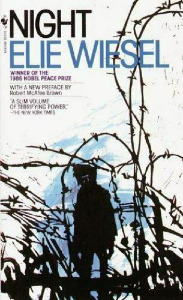About SSFP
About Us
Student Application
Subscribe to Our Newsletter
SSFP in the News
Members of Our Publishers Circle

Night, by Elie Wiesel, is based on his own personal experiences with his father in Nazi German concentration camps. Some may not consider the book a memoir since it does not follow the memories of Wiesel himself. However, it is clear that the testimony, story, and emotional truth from Eliezer—the book’s narrator—are primarily those of Wiesel. Even though some minor details are changed, what happens to Eliezer is what happened to Wiesel during the Holocaust.
At the start of the story, in the early 1940s, Jewish teenager Eliezer lives in the town of Sighet in the then-Hungarian region of Transylvania—known today as Sighetu Marmatiei and located in Romania. During this time, Eliezer studies the Torah—the first five books of the Hebrew Bible—and the Cabbala—the ancient Jewish tradition of mystical interpretation of the Bible—with a teacher named Moishe the Beadle. However, his learning is interrupted when Moishe is deported for being a foreign Jew.
A few months later, Moishe returns and tells the Jews in Sighet about the atrocities committed in the Galician forest by the Geheime Staatspolizei—known as Gestapo, the official secret police of Nazi Germany. Moishe tells them how they took over his train, led everyone on board into the woods, and murdered them according to a fixed plan.
Even though he disappears in the beginning, Moishe can also be seen as a character who is reflected in Wiesel’s adult life. In his warnings, Moishe does not stay silent and tries to warn others about the tragedies that are happening. In the same way, Wiesel did not stay silent and told his experiences in Nazi Germany, making this book able to serve as a warning from Wiesel to prevent anything like the Holocaust from reoccurring. Moishe, however, is thought to be delusional and is ignored by everyone around him, but the tragedies he warned about would come to where they lived.
In the Spring of 1944, Nazis took over Hungary and shortly after forced the Jews of Sighet into small ghettos within the town. They then drive them onto cattle cars in which they spend days and nights without much space, energy, or food. Their destination is Birkenau—the entrance to Auschwitz—where, upon arrival, Eliezer and his father are separated from his mother and sisters whom they never see again.
The first of many “selections” described in the book is when Jews are evaluated in order to decide if they should be put to work or murdered right away. Eliezer and his father, Shlomo, pass the evaluation and are taken to the prisoner’s barracks. On the way, they come across open-pit furnaces where the Nazis are burning an incredible number of babies.
The Jews are treated with cruelty while being stripped, shaved, disinfected, and then forced to walk from Birkenau to the main camp: Auschwitz. They are taken to the work camp Buna, where Eliezer is given the number A-7713 and is put to work in an electrical fittings factory in work conditions of slavery, malnourishment, and decimation by “selections.”
The prisoners are forced to watch the hangings of other prisoners in the camp courtyard, including that of a small boy the Gestapo hangs due to his association with some rebels in Buna. With the nightmarish conditions in the camps and the risk of being murdered, many prisoners begin to be concerned only with their personal survival. Eliezer begins to lose his humanity, as well as his faith in God and those around him.
This was an emotionally difficult book to read and the story was both shocking and saddening. It is, however, a lesson in how people have been dehumanized and discriminated against due to prejudice. I recommend this book to everyone, as it shows the atrocities that have happened in the past and serves as a warning to prevent the past from occurring again.
Loading Comments...